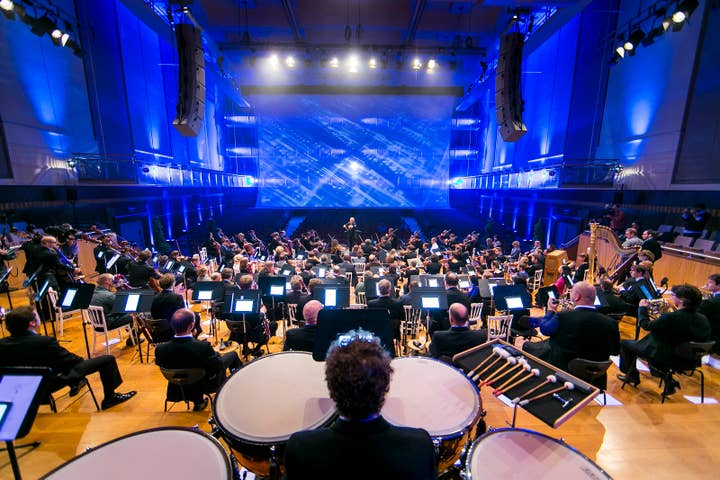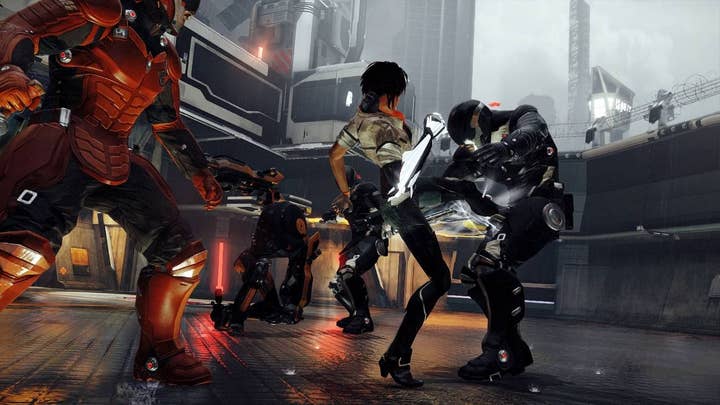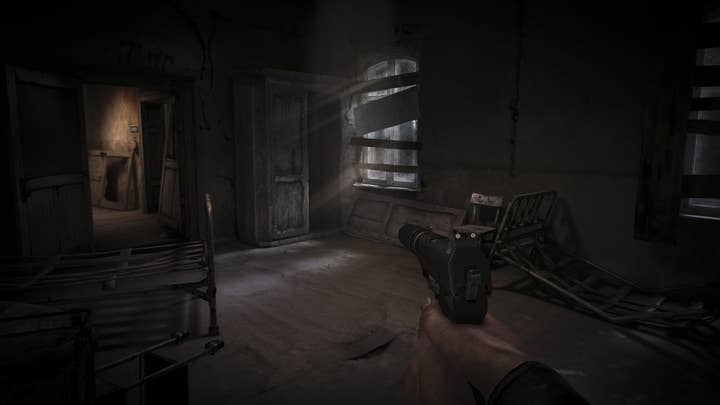Derivière: “Games music needs to emancipate itself from Hollywood”
The Get Even composer discusses the benefits of live musicians, real-time generated soundtracks, and the folly of mimicking movies
Olivier Derivière is one of gaming's more experimental composers.
Perhaps best known for his work on Capcom's promising but oft-forgotten sci-fi outing Remember Me, he has spent more than a decade exploring the possibilities for video game music - and, where possible, adding the special touch he believes only an orchestra can provide.
"I got into this 15 years ago, maybe more, mainly because I'm classically trained but I'm also a hardcore gamer," he tells GamesIndustry.biz. "I very much wanted to do something in the games industry, so I started by working on a game called ObsCure.

"What I always wanted to do, because I'm classically trained, was to bring in something that was of a high quality in terms of performance. So as soon as I started, I worked with the children's choir from the National Opera of Paris on my very first game, and since them I've always worked with the best ensemble I could find because I think this sort of performance is best for the players and for the experience."
It's the same for Get Even, Bandai Namco's dark first-person adventure and Derivière's latest project. Due to hit shelves on May 26th, the game features a soundtrack recorded with the Brussels Philharmonic Orchestra, the ensemble that won an Oscar with its performance for The Artist.
"This game is very special, it's not like any other game I've scored," says Derivière. "It's not about saving the world, or killing zombies - it's a very intimate story about humans. There are just three main characters, and it's all about them. That's why we needed an orchestra, because it's very human."
However, the use of an orchestra can be something of an expensive luxury, especially on projects as high budget as video games. While the firms behind blockbusters such as Call of Duty, Destiny and Assassin's Creed can easily afford such high-quality musicians, not all developers or publishers are so lucky. Nevertheless, wherever possible, it's something Derivière fights tooth and nail for.
"Having something live takes music to such a level of emotion and you can't reproduce that with samples"
"If you put budget aside, what's important is the music itself," he says. "Having something live takes music to such a level of emotion and you can't reproduce that with samples. If you take a guitar player and you try to [play what he has] on a synth... even though guitar samples are very good, it's never as good as a real musician. It's the same with an orchestra.
"When you want to go with an orchestra, of course there's a budget to consider but as a composer - and particularly with the experience I now have - I know when we can afford an orchestra so I can think about that when I write the score. But the more you can go live, the better it is for the music."
It's not just about the music, he adds, but also the end user. The effect a soundtrack can have on the player is "much more powerful when you have live musicians".

However, the very nature of how interactive video games are makes it challenging for a composer to use an orchestra effectively. With a film's soundtrack, for example, music is written to fit the edit, meaning the creators have complete control on the pacing, allowing composers to build up to fixed events. With a video game, players set the pace; it's all well and good writing dramatic battle music, but it's somewhat wasted if they choose to hide behind a crate, or sneak through the action. So how does Derivière write music for scenes over which he has so little control?
"You're pointing out exactly what I've been fighting for since I first started doing music for games," he says. "I'm a composer but, like I said, I'm also a gamer. As a gamer, I have some aspirations - I would like music to be like this, or to support that, depending on the function of the music.
"Composers are sometimes disconnected from the game's purpose. They will do some support for the emotion or intention but won't be involved with the interactive process"
"Composers are sometimes disconnected from the game's purpose, and the game's purpose is often based mainly on the gameplay mechanics. Most of the time, composers will do some support for some emotion or intention but they won't be involved with the interactive process of the music. We have wonderful people, music supervisors, sound engineers, sound designers and a lot of people that will help - but it's not the same.
"I've been very much active for that, I've been trying on my own. If you look back at Remember Me, I went to record a live, 70-piece orchestra - and in the game's fight sequences, the music changes depending on the move you're doing right as you do it. This is the intention the creative director had at the time, to have the music support as much of what the player is doing as possible.
"My point is you can always do something with interactivity and follow up what the gameplay mechanics are asking for, but you have to know about how to deliver this and you have to have the right mindset for it. I'm sorry to say it but there is a lack of that mindset among composers in the video game industry, and it's been like that for a long time. But with the new tools we have now, any composer can do something with interactive music and learn about this, then adapt their writing depending on the needs of the game.
"The way you write music for games should be dictated by the way you're going to record, edit and use it"
"The way you write music for games should be completely dictated by the way you're going to record it, edit it and use it. It has to be completely different from the movies, and that's something I believe games have to emancipate from.
"We need to do something only games can do - and that's something I believe we achieved on
Get Even."

In the case of his latest project, Derivière experimented with what he refers to as "real-time generated music." Part of the unique nature of video games, he observes, stems from the fact that everything occurs in real-time: animation, physics, AI, and so on.
"That's why I'm fascinated by video games," he adds. "Every time I see a pixel move because of me, I'm like 'wow'. So I thought 'okay, what can we do with music if we apply that philosophy of real-time generation?'
"Depending on how fast you go, the music will change but the effective writing is just one bar. I know that seems crazy, but this is how you can approach music nowadays"
"For Get Even, as an example, you have music all the way through the first level. It's not music as you might expect - it's much more like a texture. We actually only have one bar of music and it lasts forever if you want to remain in the level that long. Depending on how fast you go, the music will change but the effective writing is just one bar. I know that seems crazy, but this is how you can approach music nowadays. You need to think about how you can manage the fact that players could stay here forever, and what you can create that only games can [convey].
"That's what I'm talking about when I refer to real-time generated music. Every level in Get Even has a specific way of using this real-time generated music."
Get Even puts players in the shoes of Cole Black, a man who wakes up in an ayslum with a phone, a gun and no memories. The phone is bombarded with photos and messages of a teenage girl strapped to a bomb. The perpetrators call Black to taunt him as he tries to solve this mystery, central to which is a virtual reality headset that lets Black experience other connected stories. The fact that the main character is wearing an AR device presented an interesting opportunity for Derivière: writing music that reflected both what Black sees and what happens around him.
"The idea came to me on a plane to GDC," the composer says. "I was listening to the noise of the plane, but also listening to a movie. When people in the movie talked, I couldn't hear much of the plane, but when there was no dialogue that noise kept coming back. I thought maybe I could use that.
"This is what I did, for instance, in the first level of Get Even. I asked myself 'what do we have in the real world that could become musical?'. If you walk from one room to another, there's a tone to every room we go in. So I used the tone of the first room as a note to start the music and merge into something else. The room tones are all in C: they morph to a drone that's in C, there's a buzz from the lights that's in C as well, everything becomes in C but everything starts to pick up a pace - with the clock interrupting, which is very meaningful to the game. The further you go, the more the clock speeds up. You have to play the game to experience it.
"That's one of the many ideas I had for the game. The rule we set at the very start of this project was to have music that starts within the world and becomes abstract, but in such a way that you don't really notice it."

This speaks to a trend that has occurred in video game soundtracks over the last few decades. Back in the days of 8- and 16-bit titles, limited graphics capability meant the music was responsible for setting the tone with jolly tunes or darker melodies. As visuals have advanced, arguably the score has taken something of a back seat, complimenting the atmosphere rather than defining it. So how can composers like Derivière strike the balance between music that overpowers and distracts from what's happening on, or that gets missed completely?
"Composers need to understand what the vision is about, but also what music can do with this vision and what it can enhance"
"It all depends on the game itself," he says. "If you go and score an open world game, most of them will have a background music that doesn't take over. If you play [more linear] games where developers have much more control over everything that will happen, you can do music in a more structural way. As if it were - and I don't like to compare but we have to - a movie. That's the case for Get Even. You need to understand what the vision is about, but also what music can do with this vision and what it can enhance. But even in movies nowadays, music is in the background. There are no more big themes, not many melodies."
Fortunately, Derivière says more developers are starting to appreciate the importance of a great score - not just as another facet of the game experience, but one that can have a significant effect on the player.
"It depends on the people you work with, and how sensitive they are about music," he says. "I've been lucky enough to have been working with amazing people on all the different projects I've been doing that understand - sometimes after some discussion - that music is more than just a big theme, a big emotional moment.
"For games, music can be more like a sensation. It can give players rewards or information. It can give all these things that will make the game much more involving for the player. Music won't just be an illustration, it will support the player's experience - and this is something that I'm very, very glad we achieved on Get Even. I think the hard work pays off at the end of the journey.
He concludes: "Young composers are the future of games music, and I really wish that they could be more involved in the process of what a game is and how music can work with it. Writing music for games is not like the movies, a play, an advertisement or anything else. We have to go and be creative in our own medium and use the medium for what it is - not try to be what people expect us to be. We're creators, we have creativity and want to move on to create new experiences.
"I've been saying this for 15 years but we're almost in the same position. So I will keep saying it."
